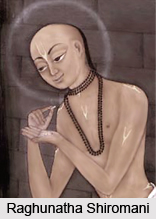 Raghunatha Shiromani (1477 - 1547) was born at Navadvipa which is in present day Nadia district of West Bengal. Sulapani , a noted writer of Smriti was his grandfather. Raghunatha was a student of Vasudeva Sarvabhauma. He also brought the new school of Nyaya known as Navya Nyaya. It represented the final development of Indian formal logic.
Raghunatha Shiromani (1477 - 1547) was born at Navadvipa which is in present day Nadia district of West Bengal. Sulapani , a noted writer of Smriti was his grandfather. Raghunatha was a student of Vasudeva Sarvabhauma. He also brought the new school of Nyaya known as Navya Nyaya. It represented the final development of Indian formal logic.
His analysis of relations revealed the true nature of number that is inseparable from the abstraction of natural phenomena. His studies of metaphysics dealt with the negation of a complex reality. One of his famous compositions was the Tattvacintamanididhiti. It was a commentary on the Tattvacintamani of Gangesa Upadhysya, the founder of the Navya Nyaya School. He is considered as one of the most original thinkers in Indian philosophy.
Raghunath studied the shastras under Pundit basudev sarvabhauma. He got lessons on Navya Nyaya from Pundit Paksadhar Misra who was an eminent logician of Mithila. He established Navadvip as the principal centre for studying Navya Nyaya.
Raghunath has written around forty books that includes commentaries. His other works include Pratyaksamani-didhiti, Anumana-didhiti, Padartha-khandana, Dravyakiranavali, Prakashadidhiti, Gunakiranavali-didhiti, Atmatattva-viveka-didhiti, Nyaya-lilavati-prakasha-didhiti, Krtisadhyanumanadidhiti, and Vajapeyavada.
This article is a stub. You can enrich by adding more information to it. Send your Write Up to content@indianetzone.com



















